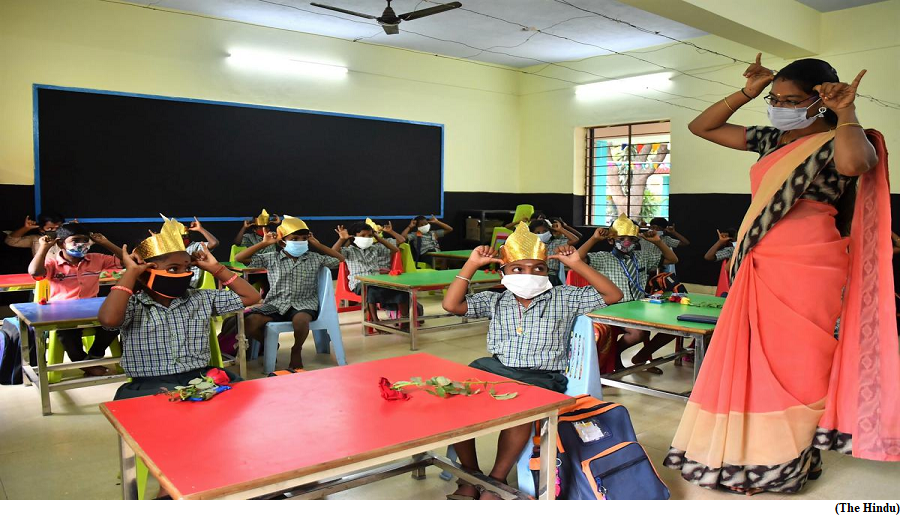A ruling that gives primary school teaching a new slate (GS Paper 2, Education)

Context:
- In August 2023, the Supreme Court of India upheld the decision of the Rajasthan High Court in ruling that the Bachelor of Education (B.Ed) degree cannot be considered appropriate for primary schoolteaching, the relevant degree for this level of school is the Diploma in Education (DEd) or Diploma in Elementary Education (DElEd) or Bachelor of Elementary Education (BElEd).
- Effectively, this nullified an earlier notification by the National Council for Teacher Education (NCTE) that the BEd degree can be accepted.
- This may seem like a minor point with regards to a profession that is widely believed to not be very aspirational. But this is a decision that has wide implications for recruitment and policy and rightly so.
Dimensions of Primary teaching:
- Teaching young students in primary grades is quite different in its requirements when compared to being a subject teacher for middle and high school.
- Understanding Foundational Literacy and Numeracy (FLN), and being able to design and involve all students in a manner that ensures that they grasp these basic and foundational competencies is a very non-trivial task.
- Hence, teaching these competencies has to be learnt by prospective primary schoolteachers, through specialised teacher education for this stage, i.e., the DEd, or DElEd or BElEd.
- It cannot be reconstructed through autobiographical memory; love for children and good communication skills are not enough, and by no means does the BEd degree, with its focus on teaching subjects to students in middle school upwards, prepare teachers for this.
Professionally qualified teachers:
- The Right to Education Act 2009, therefore, not only lay emphasis on the need for professional qualification but also the appropriate qualification to teach.
- The State of Teachers, Teaching and Teacher Education Report 2023 (SoTTTER-23) shows that 90% of teachers have some form of professional qualification. Of the 10% who do not have professional qualifications, 61% are in the private sector; 61% of this group are in rural areas. However, it is a different picture when it pertains to the issue of appropriate qualification.
- Overall, only 46% of teachers teaching primary grades have the DElEd (and equivalent) qualification; 30% of teachers in this stage have the BEd degree, and 10% have no professional qualifications.
- The proportion of DElEd qualified teachers in the government and aided sectors is between 60%-68%, as government recruitment norms, by and large, have regulated recruitment.
- However, in the primary school level of the private unaided sector, 22% have the DElEd or equivalent; 43% of primary schoolteachers in private schools have BEd degrees, and another 17% do not have any professional qualification.
What needs to be done?
- Greater attention will need to be paid to increasing the supply of good quality DEd/DElEd/BElEd programmes in the country.
- Analysis of Teachers Eligibility Test (TET) data from one State shows that quality in this sector is only from the government-funded institutions (District Institutes of Education and Training, or DIETs, and aided colleges), while the self-financed sector is doing very poorly: 59% of students from DIETs qualified with a mean score of 86/150 in comparison with only 31% of students from the self-financed sector qualified with a mean score of 77/150.
- In all DIETs, at least 50% of their students succeeded in qualifying. Only 7% of the self-financed sector were able to ensure that at least 50% of their students qualified.
- This suggests that better students seem to prefer government-funded institutions and that these institutions are probably functioning more effectively, more regularly and with less corruption.
Concerns:
- There are concerns for the sector as a whole: only 14% of qualifying candidates had a mean score of 60% or above. The low mean scores in mathematics, at 46%, are cause for concern. There will have to be more attention in ensuring higher quality and pedagogical content knowledge of candidates.
- The Teacher Eligibility Test (TET) may also need to have section-wise qualifying cut-off marks included in addition to an overall qualification cut-off mark, to ensure that primary schoolteacher competence in mathematics.
Government support:
- There is an urgent need to strengthen government support and innovation in this sector. Programmes such as BElEd offered by the Delhi University have demonstrated successful curriculum to strengthen knowledge, understanding and practice for this level/stage, long neglected in the university space.
- The recently announced Integrated Teacher Education Programme (ITEP) holds out the possibility of extending the successful model of bringing primary schoolteacher preparation into the university/Higher Education space.
- It is, therefore, disappointing that the bulk of the new ITEP programmes approved in 2023 are for BEd (about 3,4,00 seats), with only about 10% for the preparatory and foundational stage.
Pandit Madan Mohan Malaviya National Mission on Teachers & Teaching:
- The Union Budget 2023 announcement included commitment to continue the Scheme of Pandit Madan Mohan Malaviya National Mission on Teachers & Teaching (launched in 2014) to strengthen teacher education in the country.
- The scheme was finally unveiled on September 5, but, disappointingly, had a focus only on faculty development in higher education, neglecting schoolteacher preparation and innovation in the university space.
- A recent Ministry of Education initiative to strengthen DIETs is welcome.
Way Forward:
- With a full Budget expected in a few months’ time, one hopes that the government will respond in a comprehensive way to these issues, and provide allocation to strengthen primary/preparatory stage teacher education through greater government support and incentives for innovation in this sector.


